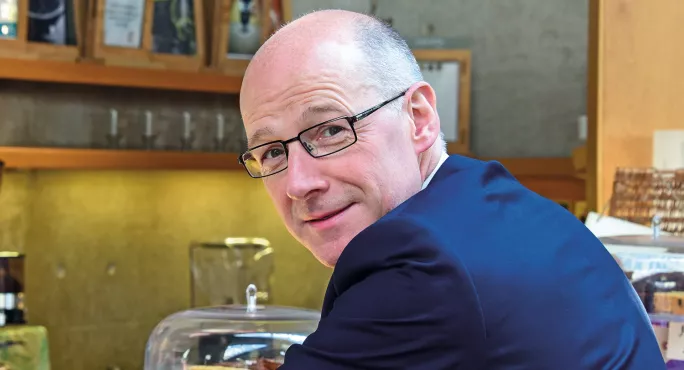
- Home
- ‘Collaboration is key to closing the attainment gap’
‘Collaboration is key to closing the attainment gap’

The new term is now well underway and it has been great being back in schools across Scotland to see the fantastic work taking place.
I write having just left a really invigorating but exhausting Maths Week Scotland event at Pitlochry High School, led by the maths magician Andrew Jeffrey. It accomplished all that I would hope for from Maths Week: it presented maths in a fun-filled way that encouraged the curiosity and participation of young learners.
Even though it has only been a few weeks since my last update, already two of the biggest dates in the political and education calendar have already been upon us.
At the beginning of the month, first minister Nicola Sturgeon published her programme for government, Delivering for today: investing for tomorrow, which reinforced our commitment to education - ensuring every child has the best start in life to help fulfil their potential. It also set out the action we will take in the coming year to deliver on our vision of a healthier, wealthier and fairer Scotland.
There was a very clear focus for the teaching profession and the wider education sector. Closing the attainment gap is the defining mission of this government and we plan to build on the progress we have already seen. Our approach means more money and more control directly in the hands of schools.
Our landmark agreement with local government to deliver a school- and teacher-led education system is already picking up pace and improvements will continue throughout the year. And, crucially, teacher and headteacher representatives are now involved at the heart of overseeing this important work.
We are now working with partners from across the education system to deliver the Headteachers’ Charter. The charter will empower headteachers to work with their school communities to make the decisions that are fundamental to running their schools such as curriculum, staffing and budgets.
We will continue to support teacher recruitment through new routes into the profession, which have already resulted in around 280 additional student teachers. And the independent panel considering the development of teacher career pathways will make its recommendations by the end of 2018, to ensure that there are as many opportunities as possible for those already working in the profession to diversify their career.
Of course, if we want to close the attainment gap we need to do more than just empower headteachers - we need to empower and support whole schools and communities.
That is why we are making £10 million available this academic year to enhance the practical support and expertise on offer to teachers through the Regional Improvement Collaboratives. This will help support practical measures to improve attainment and make sure that learning and teaching practice is enhanced. The Regional Improvement Collaboratives must be focused on supporting teachers; that is the key test for them.
Where there is collaboration already taking place, we have seen a positive impact on young people. This funding will help to build on that, further developing school networks and partnerships that are tailored to local needs.
And we will continue our work to deliver increased parental engagement through our national action plan, as well as building on the work started in this Year of Young People to ensure that pupils’ voices are heard, too.
The key thing that underpins all of these efforts to close the attainment gap is collaboration. Teachers will always be on the frontline when it comes to helping our young people realise their full potential; a truly great teacher can be the single biggest influence in the life of a young person. But that does not mean you are alone when it comes to delivering the kind of education we want every child to benefit from.
That brings me on to the other big date in the calendar, the Scottish Learning Festival (SLF) on Wednesday 19 and Thursday 20 September, which has the theme this year of “Collaboration for Improvement”.
This will be my third year attending, along with almost 4,500 delegates and some of my fellow ministers, and it is always a great platform to identify strong routes forward in Scottish education.
The excitement and enthusiasm of everyone present is infectious. It creates such an opportunity to take back to the classroom new ideas and interventions to enrich the learning and teaching experience for all. That is the type of impact we want to see from the Regional Improvement Collaboratives, too.
Although I regularly visit schools across the country every, week attending the SLF also gives me a great opportunity to meet more of the profession and hear directly about what is working well and where things could improve.
In the true spirit of collaboration I want to hear from you, the profession, so that we can work together to deliver the best possible outcomes for each and every child in Scotland.
Email me at DFMCSE@gov.scot
John Swinney is Scotland’s education secretary and deputy first minister
Register with Tes and you can read five free articles every month, plus you'll have access to our range of award-winning newsletters.
Keep reading for just £4.90 per month
You've reached your limit of free articles this month. Subscribe for £4.90 per month for three months and get:
- Unlimited access to all Tes magazine content
- Exclusive subscriber-only stories
- Award-winning email newsletters
You've reached your limit of free articles this month. Subscribe for £4.90 per month for three months and get:
- Unlimited access to all Tes magazine content
- Exclusive subscriber-only stories
- Award-winning email newsletters



